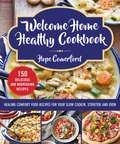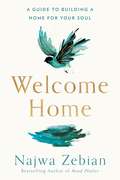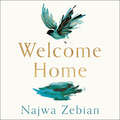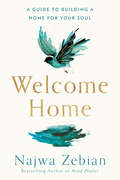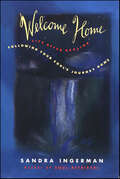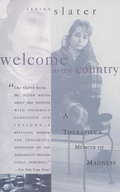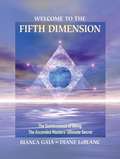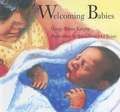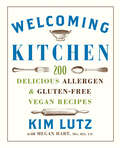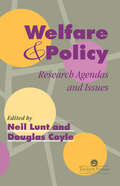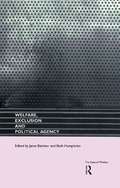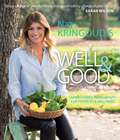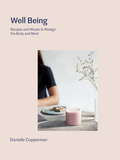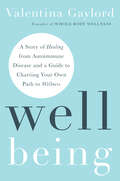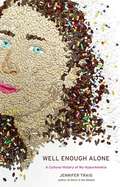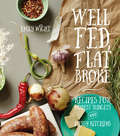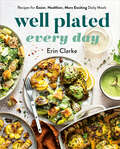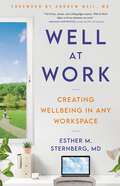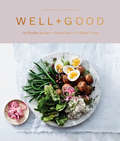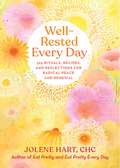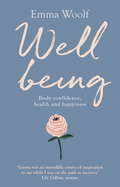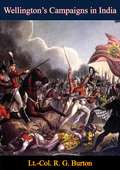- Table View
- List View
Welcome Home Healthy Cookbook: Healing Comfort Food Recipes for Your Slow Cooker, Stovetop, and Oven (Welcome Home)
by Hope Comerford150 Super Easy Healthy Recipes from the Editor of the New York Times Bestselling Fix-It and Forget-It Series! Here are 150 great-tasting recipes that are easy to prepare—and healthy! Featuring superfood, anti-inflammatory ingredients, there are plenty of options here for everyone, whether you prefer to use your slow cooker, stovetop, or oven. Each delicious recipe includes nutrition information as well as preparation time and cooking/baking time, so you know exactly what to expect. Find dishes such as: Lightened Up Spinach Artichoke DipPear Honey ButterLentil Spinach SoupSweet Potato and Ginger SoupGarlic and Lemon ChickenRaspberry Balsamic Pork ChopsCauliflower AlfredoFresh Veggie LasagnaBaked Apples with Datesand more! You can trust these recipes because they are collected from some of America&’s best home cooks, tested in real-life settings, and carefully selected from thousands of recipes. Finally, a cookbook that makes dinner easy, delicious, and healthy!
Welcome Home: A Guide to Building a Home For Your Soul
by Najwa ZebianFrom the celebrated poet, speaker, and educator comes a powerful blueprint for healing by building a home within yourself.In her debut book of inspiration, poet Najwa Zebian shares her revolutionary concept of home - the place of safety where you can embrace your vulnerability and discover your self-worth. It's the place where your soul feels like it belongs, where you are loved for who you are. Building your home inside yourself - and never experiencing inner homelessness again - begins here. In Welcome Home, Zebian shares her story for the first time, powerfully weaving memoir, poetry and deeply resonant teachings into her storytelling, from leaving Lebanon at sixteen, to coming of age as a young Muslim woman in Canada, to building a new identity for herself as she learned to speak her truth. After the profound alienations she experienced, she learned to build a stable foundation inside herself, an identity independent of cultural expectations and the influence of others. With practical tools and prompts for self-understanding, she shows you how to build each room in your house, which form a firm basis for your self-worth, sense of belonging and happiness.Welcome Home provides the life-changing tools for building that inner space of healing and solace.
Welcome Home: A Guide to Building a Home For Your Soul
by Najwa ZebianFrom the celebrated poet, speaker, and educator comes a powerful blueprint for healing by building a home within yourself.In her debut audiobook of inspiration, poet Najwa Zebian shares her revolutionary concept of home - the place of safety where you can embrace your vulnerability and discover your self-worth. It's the place where your soul feels like it belongs, where you are loved for who you are. Building your home inside yourself - and never experiencing inner homelessness again - begins here. In Welcome Home, Zebian shares her story for the first time, powerfully weaving memoir, poetry and deeply resonant teachings into her storytelling, from leaving Lebanon at sixteen, to coming of age as a young Muslim woman in Canada, to building a new identity for herself as she learned to speak her truth. After the profound alienations she experienced, she learned to build a stable foundation inside herself, an identity independent of cultural expectations and the influence of others. With practical tools and prompts for self-understanding, she shows you how to build each room in your house, which form a firm basis for your self-worth, sense of belonging and happiness.Welcome Home provides the life-changing tools for building that inner space of healing and solace.(P) 2021 Penguin Random House Audio
Welcome Home: A Guide to Building a Home for Your Soul
by Najwa ZebianFrom the celebrated poet, speaker, and educator comes a powerful blueprint for healing by building a home within yourself.In her debut book of inspiration, poet Najwa Zebian shares her revolutionary concept of home—the place of safety where you can embrace your vulnerability and discover your self-worth. It&’s the place where your soul feels like it belongs, where you are loved for who you are. Too many of us build our homes in other people in the hope that they will deem us worthy of being welcomed inside, and then we feel abandoned and empty when those people leave. Building your home inside yourself—and never experiencing inner homelessness again—begins here. In Welcome Home, Zebian shares her personal story for the first time, powerfully weaving memoir, poetry, and deeply resonant teachings into her storytelling, from leaving Lebanon at sixteen, to coming of age as a young Muslim woman in Canada, to building a new identity for herself as she learned to speak her truth. After the profound alienations she experienced, she learned to build a stable foundation inside herself, an identity independent of cultural expectations and the influence of others. The powerful metaphor of home provides a structure for personal transformation as she shows you how to construct the following rooms: Self-Love, Forgiveness, Compassion, Clarity, Surrender, and The Dream Garden. With practical tools and prompts for self-understanding, she shows you how to build each room in your house, which form a firm basis for your self-worth, sense of belonging, and happiness. Written with her trademark power, candor, and warmth, Welcome Home is an answer to the pain we all experience when we don&’t feel at peace with ourselves. Every human deserves their own home. Welcome Home provides the life-changing tools for building that inner space of healing and solace.
Welcome Home: Following Your Soul's Journey Home
by Sandra IngermanSandra Ingerman's deeply moveing debut, Soul Retrieval, captivated readers with its introduction of shamanic journeying, an ancient tradition of healig. With the characteristic warmth, passion, and authenticcity that have earned her worldwide recognition, Ingerman now continues to share her lifework with Welcome Home, an empowering action plan for creating a more positive future by truly letting go of blame and guilt.
Welcome To My Country
by Lauren SlaterA psychologist's perceptions of mental illness which are illustrated with stories her patients have told her--privacy always protected.
Welcome to the Fifth Dimension: The Quintessence of Being, the Ascended Masters' Ultimate Secret
by Bianca GaiaBased on her popular workshops in Canada and Europe, Welcome to the Fifth Dimension is author Diane LeBlanc’s guide to helping readers recognize and integrate their multiple dimensions. Through examples, exercises, and channeled teachings, she shows us how to regain our co-creative power and live each day and moment in a state of grace. The key, says LeBlanc, is Quintessence, a self-coaching program that revitalizes the five most important dimensions of human existence in order to feel better, recover from disease, and be fully happy. The book breaks Quintessence into groups of five: the five energy fields that surround the body, the individual’s five main ÒSoul families,Ó the five dimensions of the human brain, and others. The book assesses and draws on many contemporary schools of thought, as seen in books like The Law of Attraction, The Power of Now, and The Celestine Prophecy. It also provides original teachings channeled from the powerful entity LeBlanc describes as the "Mother Earth Consciousness," personified as Bianca Gaia who is LeBlanc’s alter ego. Packed with charts, diagrams, and illustrations, this compelling book encourages readers to radically enhance their health and happiness by opening their minds to this new way of thinking.
Welcoming Babies
by Margy Burns Knight Anne Sibley O'BrienWith a simple message, this book shows how people around the world lovingly care for, cherish, and welcome babies into their families.
Welcoming Kitchen: 200 Delicious Allergen- & Gluten-Free Vegan Recipes
by Megan Hart Kim LutzEat safe…and delicious, with this unique cookbook offering hundreds of delicious gluten- & allergy-free family-friendly recipes. Staying healthy is easy with these mouthwatering options meals, snacks, and holiday fare-including muffins and breads; pumpkin risotto; and hot fudge cake. This is an inspired, resource for any family or group that has varied dietary needs.
Welding Level 2: Trainee Guide (Fourth Edition)
by NccerThis exceptionally produced trainee guide features a highly illustrated design, technical hints and tips from industry experts, review questions and a whole lot more! Key content includes Welding Symbols, Reading Welding Detail Drawings, Physical Characteristics and Mechanical Properties of Metals, Preheating and Postheating of Metals, GMAW & FCAW - Equipment and Filler Metals, GMAW & FCAW - Plate, GTAW - Equipment and Filler Metal, and GTAW - Plate. Instructor Supplements Instructors: Product supplements may be ordered directly through OASIS athttp://oasis. pearson. com. For more information contact your Pearson NCCER/Contren Sales Specialist at http://nccer. pearsonconstructionbooks. com/store/sales. aspx. Annotated Instructor's Guide 9780136099727 Additional TestGen Software Access Code Cards 9780138024468 PowerPoint#65533; Presentation Slides (in color) 9780132130257 Welding Levels 1-4 Performance Labs 9780132160001 NCCER CONNECT Trainee Guide Paperback + Access Card Package: $119 978-0-13-286595-1 IG Paperback + Access Card Package: $194 978-0-13-286594-4 Access Card ONLY for Trainee Guide: $94 (does not include print book) 978-0-13-285924-0 Access Card ONLY for IG: $100 (does not include print book) 978-0-13-286010-9 ELECTRONIC Access Code ONLY for Trainee Guide: $94 (must be ordered electronically via OASIS; does not include print book) 978-0-13-292172-5 ELECTRONIC Access Code ONLY for IG: $100 (must be ordered electronically via OASIS; does not include print book) 978-0-13-292173-2
Welfare And Policy: Research Agendas and Issues
by Neil Lunt Douglas CoyleFirst Published in 1996. Routledge is an imprint of Taylor & Francis, an informa company.
Welfare, Exclusion and Political Agency
by Janet Batsleer Beth HumphriesWelfare, Exclusion and Politcal Agency develops key topics in social work and social policy relating to exclusion, social divisions and control in welfare. It provides theoretical tools for students, academics and professionals whose work involves them in supporting the political agency of excluded groups. At a time when there have been profound shifts in the organization of welfare and the underpinning theories of the associated professions, the book tackles issues such as: *the move away from publicly funded welfare *the loss of a public service ethic *reduction of input from professionals in policy *loss of professional skills *increase of bureaucracy.
Well & Good: Supercharge your health for fertility & wellness
by Nat KringoudisWell & Good will set you on the path of priming your body for a complete wellness overhaul, because fertility isn't just about babies or a thriving reproductive system, it's about taking control of your health on all levels.With plenty of tips and recipes, Nat Kringoudis shows step-by-step how to take charge of your health and wellbeing. Her knowledge is not only for those want to boost their fertility, but for anyone who wants to experience better daily health.If you are ready for healthy hormones, Well & Good has all the information you need:• Top-ten foods for increased fertility• Ten steps to wellness• Your Fertile Pantry handy shopping list• Special tips for boosting men's reproductive health• Tips on revving up your fertility before conception• Tips for anyone who suffers from hormone imbalances and endometriosis• More than forty delicious and simple recipes to improve fertility and hormone health• How to look after your body when your baby arrives• Debunking ovulation myths.
Well Being
by Danielle CoppermanThere is no set formula to wellbeing. Our individual minds, moods, environments and circumstances all contribute to how we feel. In order to live well, we must take a holistic approach by exploring the connection between the body, mind and soul. When Danielle was struggling with low energy and stress, she began to search for ways in which food, movement and rituals could contribute to her physical and mental health. Well Being is divided into time-specific sections to take you through the day from morning to evening, with each section outlining suggested practices, rituals and recipes for specific feelings, moods and situations. With tips on food and mindful living, Danielle guides you through simple practices, such as breath regulation and yoga flow routines, and offers delicious recipes including Date, Orange, Almond & Honey Bircher; Sweet Potato Gratin and Chocolate Cookie Crunch Bars. There are even recipes for your home, from Palo Santo Atmosphere Spray to natural beauty products like Rose & Cucumber Wake Up Well Toning Mist and Mocha, Almond & Macadamia Body Scrub. This is a comprehensive handbook to guide you through everyday life with a little more serenity.
Well Being: A Story of Healing from Autoimmune Disease and a Guide to Charting Your Own Path to Wellness
by Valentina GaylordA fitness celebrity shares her story of overcoming autoimmune disease—and helps you chart your own path to wellness in body, mind, and soul.Being diagnosed with a chronic illness can be stressful, confusing, and scary—especially when the path to healing seems to be nowhere in sight. Valentina Gaylord knows this firsthand because she has lived it. She survived a terrifying series of health challenges that started when she was stricken with Bell&’s Palsy and launched on a years-long journey to recover her health—which, after exhausting every avenue that conventional medicine could offer, she finally did by turning within.In WELL BEING, Gaylord dissects the course of her own decline from exuberant wife, mother, and fitness entrepreneur to pain-riddled, exhausted, and desperate victim of disease. She details the dedicated and educated response she brought to her debilitating illnesses as she battled to restore her health. And as she tells her story, she invites you to chart your own path of healing in body, mind, and soul.Drawing on her personal experience and intensive research as well as her work with clients in the boutique fitness studios she founded and owned for over ten years, Gaylord shares exercises and techniques that put mindset, emotional wellness, and spiritual awareness at the forefront of health. In each chapter, she offers thoughtful questions and carefully crafted journal prompts to help you:Pay attention to your body and listen to its messages for you Unravel the mysteries of your own health challengesStart to write your own healing storyFind your way to true well being—not just renewed vitality, but a new sense of fulfillment and purpose that will transform your life&“Untangling the impacts of autoimmune disease was just the beginning for me,&” Gaylord writes. &“It demanded an evolution of my mind, heart, soul, and body. My reawakening took over a decade. Yours will not.&”
Well Being: Recipes And Rituals To Realign The Body And Mind
by Danielle CoppermanWith over 200 recipes and 60 rituals, Well Being is divided into time-specific sections, taking you through the day from morning to evening, with each section offering harmonising practices and recipes for specific feelings, moods and situations. With tips on food and mindful living, Danielle guides you through simple rituals such as breathwork (Pranayama), meditation and yoga postures, and offers delicious, all-natural recipes such as Date, Almond and Orange Blossom Bircher, Cassava Bagels and White Bean Carbonara as well as basic pantry staples such as Almond Cashew Mayonnaise, Kombucha and Sauerkraut. There are also recipes for your home, such as Coconut Oil Candles and a Calming Essential Oil Atmosphere Spray, alongside natural beauty treatments such as Wake Up Well Brightening Face Spritz. With this unique collection of recipes and rituals, you can explore exactly what helps you to live and function well and take whichever parts of Danielle's advice that fits into your life. @dcopperman (Instagram)
Well Enough Alone: A Cultural History of My Hypochondria
by Jennifer TraigA hilarious first-person account of life as a hypochondriac, as well as a look at the condition's history and broader cultural context, from the critically acclaimed author of Devil in the Details. The good news is Jennifer Traig does not have lupus, multiple sclerosis, Huntington's disease, Crohn's disease, or muscular dystrophy. She discovers that she does not have SUDS, the mysterious disorder that claims healthy young Asian men in their sleep, nor does she have Foreign Accent Syndrome, the bizarre but real neurological condition that transforms native West Virginians into Eliza Doolittle overnight. What she does have is hypochondria. Jenny Traig's inquiry into her ailment is not only an uproariously funny account but also a literary tour of hypochondria, past and present: the implied hypochondria of the Talmud, the flatulence-obsessed eighteenth century, and the malady's current unfortunate lack of a celebrity spokesperson. At the same time, Traig provides an intimate look at the complement of minor conditions that have concealed her essential health and driven her persistent self-diagnosis: the eczema, the shaky hands, and, worst of all, the bad hair. To her surprise, she ends her journey more knowledgeable than she was when she started out, a little less neurotic, and-one might say-healthier. Well Enough Alone is the definitive book on being worried well, in all of its gruesome and hysterical detail, from one of our funniest and most distinctive literary voices.
Well Fed, Flat Broke
by Emily WightA down-to-earth cookbook that proves you don't need a lot of money to create nutritious, beautiful meals at home.In this winsome cookbook, blogger Emily Wight offers fantastic recipes, ideas, and advice on how to prepare imaginative, nutritious, and delectable meals without breaking the bank. Perfect for students, families, and anyone on a budget. Well-Fed, Flat Broke proves that while you may occasionally be flat broke, you can always be well fed.This collection of 120 recipes ranges from the simple (perfect scrambled eggs, rice and lentils) to the sublime (Orecchiette with White Beans and Sausage, Mustard-fried Chicken). Chapters are organized by ingredient so that you can easily build a meal from what you have on hand. Well Fed, Flat Broke has flavours to please every palette including Thai, Dutch, Indonesian, and Latin American-inspired recipes such as Kimchi Pancakes, Salvadoran Roast Chicken, and Pantry Kedgeree, reflecting a diverse array of affordable ingredients and products in grocery stores, markets, and delis.Emily is a working mother and wife who lives with a picky toddler in one of Canada's most expensive cities. She offers readers real-talk about food, strategic shopping tips, sound advice for picky eaters, and suggestions on how to build a well-stocked, yet inexpensive pantry. Cooking every night can be challenging for busy families who are short on time and lean in budget; Emily includes plenty of one-pot dishes to keep everyone healthy, full, and happy.With friendly charm and practical advice, Well Fed, Flat Broke will have you eating like a millionaire without having to spend like one.Emily Wight is a writer and home cook who's been blogging about food for the past six years.
Well Plated Every Day: Recipes for Easier, Healthier, More Exciting Daily Meals: A Cookbook
by Erin ClarkeFrom the author of the bestselling The Well Plated Cookbook comes a collection of 100+ recipes for easy and creative everyday meals (that even work for hangry o&’clock)Erin Clarke&’s hugely popular food blog and her bestselling debut cookbook have brought her easy, flavor-packed, &“just happens to be healthy&” approach to cooking to the masses. Now Erin offers a collection of recipes that can be on regular rotation and excite us every day. Dependable, but also special, the recipes in this save-you-every-time cookbook showcase Erin&’s mastery of dishes that are just a little lighter but pack the same punch, flavor combos that will surprise and delight family and friends, and cooking techniques that save steps and effort. Well Plated Every Day will inspire you to cook, because they are the recipes that you and your family will want to eat. Every day.Most of the recipes in this essential cookbook are all-in-one, ready-in-less-than-an-hour main dishes. Need a fast, quick meal everyone will love? Sheet Pan Honey Orange Pistachio Salmon is the answer. Making crispy Chicken Schnitzel? Erin will help you roast cabbage right along with it so you can check off those veggies. Love pasta? Try the Creamy Harvest Chicken Pasta, which sneaks in butternut squash and whole grains. Who can say no to dessert? With simple, throw-them-in-the-oven treats like Blueberry Cornmeal Crisp and Pumpkin Gingerbread Squares, satisfying your sweet tooth is a snap. When you have a little more time, no one will know that your Cheater&’s Cassoulet took a fraction of the time.Complete with tips for healthy swaps and &“next level&” flavor boosts that make each dish even more delicious and company-worthy, Well Plated Every Day is your roadmap to great food on the daily.
Well at Work: Creating Wellbeing in any Workspace
by Esther M. Sternberg, MDLONGLISTED FOR THE 2023 OWL AWARDS Full of science-backed tips on how to design any workspace for physical and emotional wellbeing, &“Well at Work helps us thrive wherever we work.&” (Arianna Huffington) Whether you work in a traditional office or a corner of your bedroom, staying well at work need not be a luxury. But wellness at work isn&’t just about staying physically healthy; it&’s also about reducing stress and improving mood, focus, energy, and productivity.Well at Work reveals how to optimize our workspaces for wellbeing across the seven domains of integrative health: stress and resilience, movement, sleep, relationships, environment, nutrition, and spirituality, and even the air we breathe. You&’ll learn: How the environment you work in all day can affect your sleep at night Optimal lighting and noise levels for reducing stress and improving focus How to adjust temperature and humidity to stay alert and protect against infection Why open-plan offices can keep you more active The myriad benefits of access to nature (and how to bring nature indoors) Office layouts that foster social interactions but not distraction Foods to enhance cognitive performance And more Along the way, you&’ll meet the scientists and doctors, designers and architects, and building science professionals who are striving to make workplaces more conducive to wellbeing. And you&’ll glimpse into the future of the workplace, where artificial intelligence and the metaverse will help us create environments that respond to our individual needs. Above all, you&’ll come away with a menu of simple, &“innovative, and often overlooked&” (Dr. Richard Carmona) steps anyone can take to be—and stay—well at work.
Well+Good: 100 Healthy Recipes + Expert Advice for Better Living
by Alexia Brue Melisse GelulaRECIPES TO IMPROVE YOUR SKIN, SLEEP, MOOD, ENERGY, FOCUS, DIGESTION, AND SEX From the trusted, influential, and famously trend-setting website comes the first ever Well+Good cookbook. Founders Alexia Brue and Melisse Gelula have curated a collection of 100 easy and delicious recipes from the luminaries across their community to help you eat for wellness. These dishes don’t require a million ingredients or crazy long prep times. They are what the buzziest and busiest people in every facet of the wellness world—fitness, beauty, spirituality, women’s health, and more—cook for themselves. Enjoy Venus Williams’ Jalapeno Vegan Burrito, Kelly LeVeque’s Chia + Flax Chicken Tenders, Drew Ramsey’s Kale Salad with Chickpea Croutons, and Gabrielle Bernstein’s Tahini Fudge, among many other recipes for every meal and snack time. Whether you want to totally transform your eating habits, clear up your skin, add more nutrient-rich dishes to your repertoire, or sleep more soundly, you’ll find what you need in this book. Along with go-deep guides on specific wellness topics contributed by experts, this gorgeous cookbook delivers a little more wellness in every bite.
Well-Rested Every Day: 365 Rituals, Recipes, and Reflections for Radical Peace and Renewal
by Jolene HartJolene Hart—bestselling wellness book author of the Eat Pretty series—offers moms, professionals, and overextended women of every stripe day-by-day inspiration for bringing peace, restoration, and radical change into their lives in this empowering gift book. Well-Rested Every Day is an inspirational guide for the millions who recognize their need for rest, but lack the knowledge, ideas, or support to take action. Its pages offer 365 ideas to inspire pause, including simple tips and recipes that calm and restore the body; rituals that encourage presence, stillness, and intuition; practical applications of the most cutting-edge science on rest; and guidance on shifting habits and mindsets that block the ability to rest.Whether you&’re a stay-at-home parent, entrepreneur, caretaker, professional, or any combination of these and other highly demanding and stressful roles, it's easy to forget how—and why—rest matters, as long as we can maintain a constant busy pace. Well-Rested Every Day will show you why rest is an intuitive, brave, and even radical act—one that adds value and depth to our lives rather than removes opportunities. It will show you why rest and stillness make space for possibility—to become our best selves, to more deeply enjoy life, to celebrate all that is good in this moment and all that is to come in the future. Above all, this book is a timeless celebration of the power of rest and a woman&’s right to claim it on any day—in any moment—she chooses. This book will engage you not just for 365 days but for years to come by building a more rest-focused lifestyle one tip, recipe, ritual, or reflection at a time.
Wellbeing: Body confidence, health and happiness
by Emma WoolfHow do we stay strong and resilient in a world where the obsession with image and lifestyle has reached fever pitch?Never have young women been under so much pressure. We're bombarded with unrealistic images of perfection - and it's taking a major toll on our physical and emotional wellbeing. We're supposed to be working out, eating clean, deliriously happy and successful, with the perfect relationship, career and body. No wonder so many of us are experiencing a wide range of mental health problems.Emma Woolf offers positive strategies and tools for coping with modern life, eating well and feeling great, dealing with setbacks and heartbreak and hanging on to your self-esteem and mojo at all costs. She covers topics including social media, clean eating, healthy sleep, nutrition and exercise, tackling depression, anxiety and eating disorders.Whatever challenges you might be facing, you'll find Wellbeing inspiring, practical and relatable.
Wellbeing: Body confidence, health and happiness
by Emma WoolfNever have young women been more under siege from the modern world, with pressure to look, feel and be physically and mentally perfect. Many are struggling to live up to the role models dictated by social media, from eating right to forming proper relationships and wearing the right clothes, and increasing number of teenage girls and young women are experiencing anxiety, depression, and other mental health problems. This book explores how to keep resilient and buoyant in an imperfect, real life. It presents tools for coping with heartbreak and setbacks, for learning and working, and for hanging on to your self-worth and your mojo at all costs! Topics include:What is mental wellbeing?Anxiety, panic disorders, depressionRelationships and sexBody image and self-esteemNutrition and dietsExercise and a healthy bodyHow to fight your cornerIf you need therapy, and other helpCrises and coping strategiesRenowned writer and broadcaster Emma Woolf says: `Facebook can be fun but it?s not reality. We know that social media creates intense pressure to portray the perfect lifestyle - your beautiful bikini-body, protein-packed smoothies after your pre-dawn workout, romantic dinner cooked by your boyfriend, stunning selfies with flawless make-up, yoga on the beach at sunset, and so on. For the majority of young women, living normal lives, this kind of filter-fabulous lifestyle is simply not achievable. This book shows how to break the cycle of compare-and-despair perpetuated by social media, and shows how it is possible to be thin enough, fit enough, and successful in what matters: family, relationships, study, careers, positivity and self-confidence, aspiration and achievement, helping others, staying mentally and physically well.?
Wellington’s Campaigns in India
by Lt.-Col. R. G. BurtonOriginally published in 1908 by the Intelligence Branch of the Indian Army, this is a complete and connected account of the campaigns of the Duke of Wellington whilst in India, as written by Major R. G. Burton, 94th Russell’s Infantry, who later rose to the rank of Lieutenant-Colonel.An invaluable addition to any Indian Military History collection.
